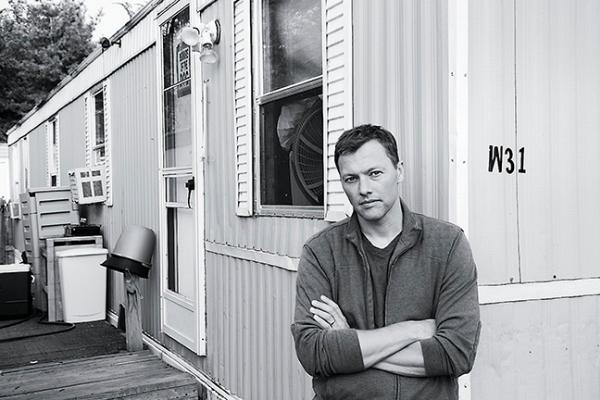It’s awkward to become famous for writing about poverty. Just ask Harvard sociologist Matthew Desmond, whose book Evicted: Poverty and Profit in the American City won the 2017 Pulitzer Prize for nonfiction. For his research, Desmond spent more than a year living in trailer parks and inner-city rooming houses to document the housing struggles of eight Milwaukee families—struggles that Desmond could not forget.
“I couldn’t help but translate a bottle of wine placed in front of me at a university function or my monthly daycare bill into rent payments or bail money back in Milwaukee,” writes Desmond in Evicted. “It leaves an impression, this kind of work. Now imagine it’s your life.”
Desmond used the proceeds from Evicted to create two foundations: Just Shelter, which highlights organizations preserving affordable housing, and another to directly assist the families he writes about in the book. But Desmond doesn’t want to be lionized; he wants to reframe the conversation about poverty in America.
“When we talk about the poor, it’s almost as if we talk about them as isolated from the rest of us, as if their lives aren’t connected to ours—but they absolutely are,” Desmond told Sojourners associate editor Betsy Shirley. As he sees it, that means we all need to consider “how we receive some benefit that others don’t—and ask hard questions about the fairness of that.”
Sojourners: When someone is evicted, what happens?
Matthew Desmond: Eviction causes loss: Kids lose their schools; families lose their homes, their neighborhood ties, their community ties. Those evicted also lose their things, which are either taken by movers or piled up on the sidewalk. It takes a good amount of money and time to build up a home and an eviction can erase all that.
A lot of our public housing facilities also count evictions as a mark against people’s applications, which means we are systematically denying housing help to people who most need it. We have a study that shows eviction can lead to job loss. Then there are health effects, the effect eviction has on your mental health and your spirit. When you add all that up, we have to conclude that eviction isn’t just a condition of poverty, but also a cause of it.
You write in Evicted that poverty is a relationship. What does that mean? There are two main ways we think about poverty. If we lean right, we tend to attribute poverty to individual choices, like having a kid outside of wedlock or not finishing high school. And if we lean left, we attribute poverty to what sociologists like to call “structure”—big, historical forces like the loss of a factory base or legacies of racial discrimination.
But there’s a third way of understanding poverty, and that’s the relational way: The rich and the poor are bound together in relationships of mutual dependence and struggle. In relationships of landlords and tenants, more rent means, literally, less money for tenants and more money for landlords.
So if poverty is a relationship, who are the people involved? When it comes to housing, you can focus on landlords and tenants, then expand your vision to think about lending institutions and government regulations that influence the lack of affordable housing in our cities today.
And you can think about us, people that read Sojourners magazine. When we talk about inequality in America, we tend to focus on the top 1 percent, which allows us to locate the problem off in Swiss bank accounts or on yachts somewhere. That absolves us from asking really hard questions about how our security and the benefits that we receive contribute directly to America being a rich democracy with the worst poverty.
What kind of benefits are you talking about? We spend way more money on homeowner tax benefits than we do on direct housing assistance to the needy. We give the most help to people that need it the least when it comes to housing in this country.
How did churches engage with the families that you write about in Evicted? For many of the families I spent time with, the church was really important, especially for Crystal and Lorraine, who were avid churchgoers and rooted their identity deep in their faith. They both received material help from the church now and again, but neither of their churches were equipped to meet their needs in a sustainable fashion. So Lorraine and Crystal got out of their church what Crystal would call “the peace.” They got something spiritual, they got something meaningful, but [not] money to pay the rent. These were not churches from Acts 2; most of our churches aren’t.
In the book, one pastor tells you that it’s the church’s job to take care of the poor and the hungry, not the government. What’s your reaction to that? I have two reactions. One is that the proof is in the pudding: The church has led on issues of hunger and homelessness, but this is a problem of massive scope, and if we want to hold on to that position, then the church needs to make an investment that’s incredibly serious and will demand sacrifice from its members.
And my second response would be that nothing replaces “the state,” which is just a fancy way of saying “us collectively working together as a nation to make our country better, especially for the least of these.”
What would it take for our nation to ensure everyone has access to affordable housing? We could take a program that works pretty darn well—the housing-voucher program—and expand it to everyone below the poverty line. That would make a huge difference. Now, that would cost money; a Bipartisan Policy Center estimate suggested that expanding housing vouchers would cost about $22.5 billion more every year. That’s not a small figure.
But it’s really important to recognize that we spend more than $100 billion every year on homeowner tax benefits that go to families with six-figure incomes. There could be modest revisions to the mortgage deduction that could free up a lot of support for housing assistance loans to families that need it the most. But it would mean those who have more on their plate sharing a bit with folks who have a lot less. There’s no other way to real reform.
How could churches provide meaningful ways to help people find and keep affordable housing? Churches could provide access so that low-income families have more expansive housing searches. If you follow folks looking for housing, they’re often on the bus or on foot, they’re not using the internet. Churches could start a service where they provide families looking for housing with internet help, and folks who have cars could drive them so they can look at housing in areas that are safer and have better schools for their kids.
Churches could also start programs that expand emergency assistance for families facing temporary setbacks. Or take on exploitative lending practices, like payday lending operations.
And there’s the role that churches can play in narrative change: Making a case that the country has a moral obligation to house its people. Whatever we care about—education inequality, health disparities, crime reduction, family stability, neighborhood vitality—the lack of affordable housing is going to be at the root of that issue.
What can people who have experienced eviction teach the church? I think that they can teach about how much human potential and creativity we squander. There’s this little scene in Evicted where Crystal and Vanetta are eating lunch at a McDonald’s and this boy walks in. They’re homeless and they pool their money, buy this boy lunch, and send him on his way. I think those kinds of acts remind us how gracefully and beautifully people refuse to be reduced to their hardships.

Got something to say about what you're reading? We value your feedback!


